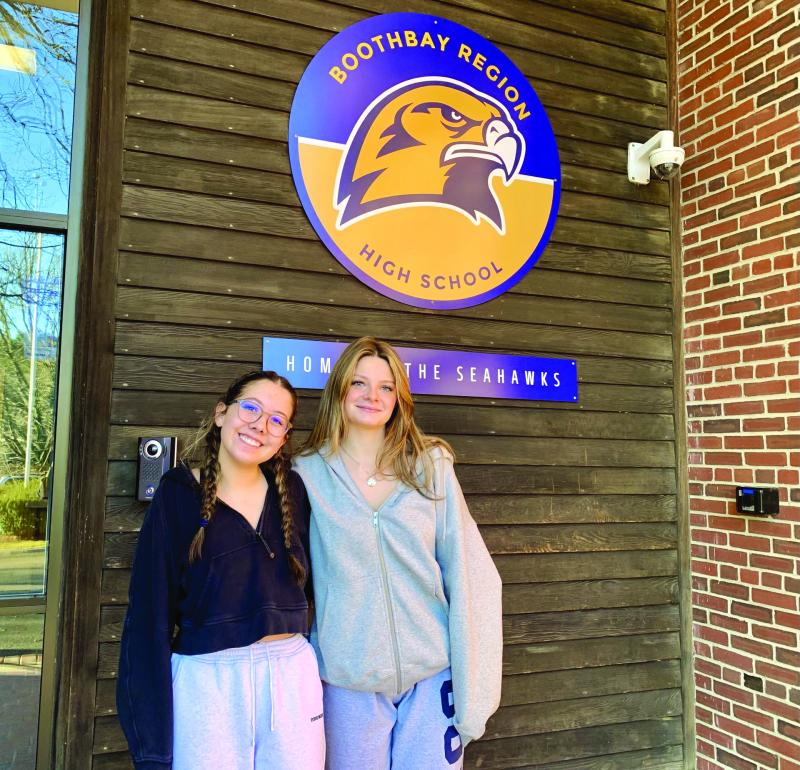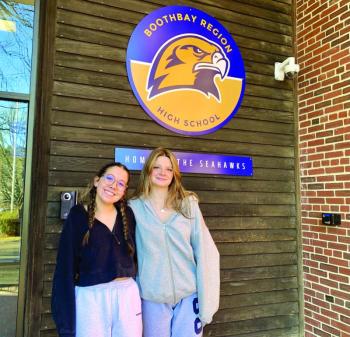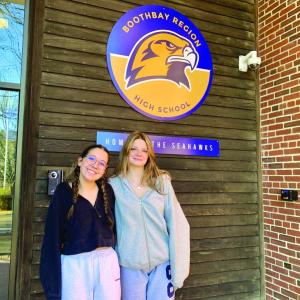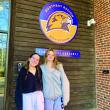Carrying the weight of graduation fundraising
If you happened to stop at Brady’s restaurant between rounds of Early Bird shopping, you would have seen them behind the grill and on the floor: Boothbay Region High School’s Class of 2026 serving up pancakes to raise money for graduation.
It’s customary not to fundraise for graduation until junior year, but with the uptick in expected costs, students are feeling the pressure, especially those in leadership positions such as junior class president Sarah Harris and vice president Eleanor Marshall.
Last year, Marshall did a deep dive into graduation costs as part of her Champions for Change project. The findings were published in the Boothbay Register this past June. The piece detailed how costs have risen exponentially since the COVID-19 pandemic due to the adoption of several optional features, including outdoor graduation equipment and the banners hanging at Boothbay Center. At the time, this totaled to about $14,000.
“It was shocking for me. It was shocking for (my classmates),” said Marshall. She explained that there was no clear communication with the class about how much money it had to raise, or where this money went. The class was left to “scramble” and entered its junior year with no funds. This made initial organizing efforts hard, as any profits took a sizable cut as they had to “pay themselves back” before they got a cushion.
According to BRHS Principal Tricia Campbell, it's been hard to maintain a routine for classes due to the disruptions caused by COVID and last year’s flood at the elementary school. Currently, she meets with leadership from each class and checks in with planning and fundraising activities. Students also convene monthly as a class group with their advisors. She is hopeful that “tightening” up this system will also strengthen the lines of communication. Harris and Marshall said they do see improvement since younger grades have already begun to fundraise.
In addition, Campbell said the school has decided to switch to an indoor ceremony as bad weather over the past two years has caused classes to be unable to use the expensive rental chairs and tents. The updated approximate cost breakdown provided by Dean of Students Allan Crocker is as follows: $60 baton; $2,200 for diplomas/caps and gowns, and $6,300 for the banners.
Even with the reduced cost, Harris said the class is still expected to raise about $10,000 by October of its senior year. The average pre-COVID graduation ranged from $3,000 to 5,000, depending on class size.
However, both girls are optimistic, saying they’re on a “good track” after the Pancake Breakfast raised over a thousand dollars. They both also highlighted the support the community has shown. “They're helping us graduate. They are our backbone for literally everything. It’s really nice knowing you have that other family that's just going to take care of you,” said Marshall.
Harris and Marshall are also happy to be able to hit the ground running with their new leadership positions, although both have been involved in student council since freshman year. Harris recalled helping her three older siblings, who all attended BRHS, with their own class fundraisers and how community involvement was an essential part of their high school experiences.
However, running for student council was still daunting for Harris as she didn't know most of the other children, transferring to the Boothbay school system after spending time at Southport Central School and the Center for Teaching & Learning in Edgecomb. The experience since has been “awesome,” allowing Harris to both carve a niche amongst her classmates and set herself apart from the siblings who came before. “Being able to create an identity for myself here has been huge,” she said.
Marshall had a similar experience, originally coming from the Seacoast area of New Hampshire and enrolling in Boothbay Region Elementary School during the height of the pandemic. It wasn’t until joining student leadership that she truly got to know her classmates. “(This) was a way for me to show my class and my school community: 'Here I am.'"
As much as the pair enjoy their roles, they still face the issue that plagues every class: lack of participation. Or more accurately, the same group organizing, and running fundraisers. In her original essay, Marshall suggested a possible solution could be making participation in at least one fundraiser a graduation requirement, a statement she still stands by. She pointed to the beneficial skills gained from community organizing, drawing comparison to the 20 hours of community service students are already expected to complete to graduate. Some students may also find they enjoy the experience once they're put outside their comfort zones.
Harris and Marshall did praise the increased willingness they’ve seen from their classmates to get involved, compared to past years. The pair attributed this partly to their growing confidence to play “good cop, bad cop” when needed, and a renewed sense of momentum now that their destination is clearer. “I feel like our class now has a new, restored confidence,” said Harris.
“This year for me, I have felt so at home in this community. They have truly welcomed me and our class with open arms, and (shown) they just want to help,” Marshall added.
In partnership with Seawicks, the junior class is currently selling Forest & Sea-scented candles for $16. For more information, contact 2026fundraiser@aos98schools.org
























